See how scholars link China and Russia to ancient biblical prophecies, sparking debates and interpretations that bridge past predictions with current events.
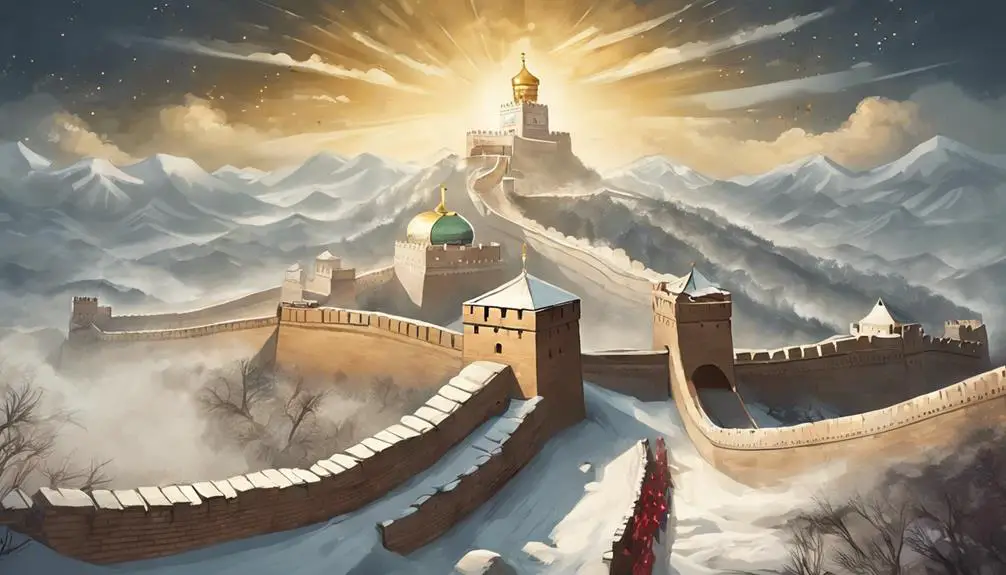
China and Russia in the Bible
While you might initially think the ancient text of the Bible doesn't mention modern nations, a closer look into prophecies suggests otherwise.
You'll find that interpretations linking Russia and China to biblical prophecies are not only intriguing but steeped in centuries of scholarly debate. For instance, some see Russia as the land of 'Magog' and China as the 'kings from the East' mentioned in Revelation.
These interpretations open up a rich discussion on historical context, symbolic representations, and the modern implications of these ancient prophecies. As we explore these connections, you'll discover why these perspectives continue to fuel controversies and debates among scholars and believers alike.
Key Takeaways
- Biblical prophecies like 'Gog and Magog' are often linked to regions north of Israel, suggesting historical ties to modern Russia.
- The concept of 'Kings from the East' in the Bible is symbolically associated with China, reflecting its historical power and cultural significance.
- Interpretations of Russia and China in biblical prophecy vary, requiring a nuanced understanding of historical and geopolitical contexts.
- Symbolic representations, such as dragons and walls, in the Bible could allegorically reference the strength and isolation of ancient empires, potentially including China and Russia.
Historical Context and Interpretation
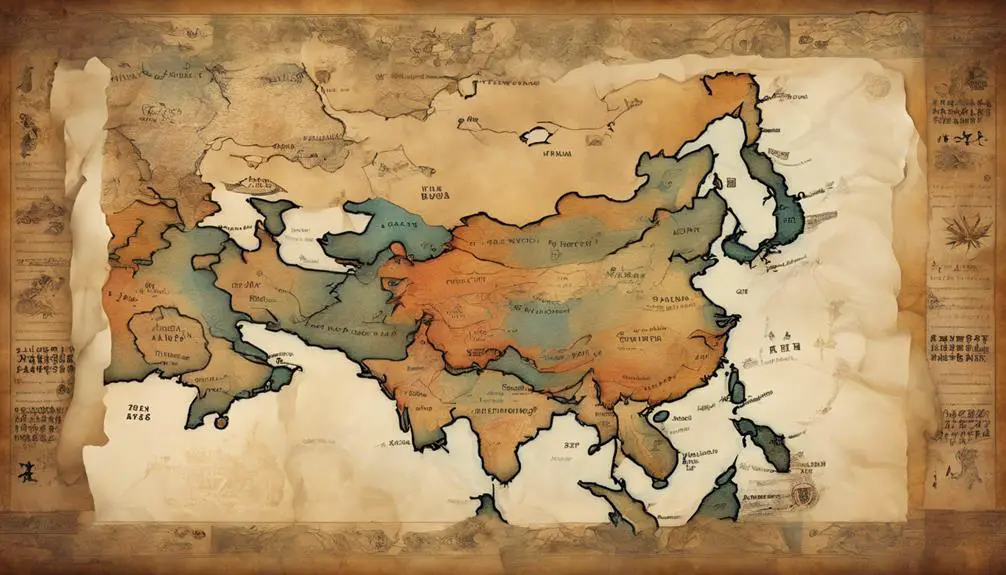
In exploring the historical context and interpretation of China and Russia's mentions in the Bible, it's crucial to understand that these references are often symbolic, reflecting the geopolitical landscapes of ancient times rather than direct mentions of these modern nations. You'll find that the Bible, a compilation of texts written over centuries, uses imagery and allegory to convey its messages, making the identification of specific modern countries challenging.
When you dig into the ancient context, the notion of ancient alliances becomes relevant. These alliances, often formed between neighboring kingdoms and empires, played pivotal roles in shaping the political and military landscapes of the time. The Bible's references to nations and peoples are, therefore, more about the roles these entities played in the biblical narrative rather than pinpointing current nations like China or Russia.
Moreover, translation variations add another layer of complexity to understanding these references. The Bible has been translated into numerous languages over the centuries, and each translation can introduce nuances that might alter the interpretation of specific passages. For instance, terms used to describe ancient empires or territories might be interpreted to refer to China or Russia in some translations, but this is often the result of the translator's interpretation rather than a direct biblical assertion.
Understanding the Bible's references to nations requires a nuanced approach, considering the symbolic nature of these mentions, the historical context of ancient alliances, and the complexities introduced by translation variations. This analytical lens helps to clarify that direct mentions of modern countries like China and Russia aren't present in the Bible, but rather, these discussions are rooted in broader, more symbolic interpretations of ancient geopolitical realities.
Russia in Biblical Prophecy

Exploring Russia's place in biblical prophecy necessitates a deep dive into the complexities of scriptural interpretation and historical context. Many scholars and theologians have pondered the Gog Magog identity, often linking it to modern Russia through a combination of linguistic, geographical, and historical analysis. Central to this discussion are Ezekiel's visions, which provide a prophetic framework that has intrigued and baffled interpreters for centuries.
To help you understand Russia's intriguing position in biblical prophecy, consider these key points:
- Gog Magog Identity: The term 'Gog and Magog' often leads scholars to connect these names with regions and peoples north of Israel, with some interpretations pointing towards modern Russia.
- Ezekiel's Visions: These chapters in the Bible describe a future invasion of Israel by a vast coalition led by 'Gog,' which many align with the lands constituting present-day Russia.
- Historical Context: Understanding the historical and geopolitical realities at the time Ezekiel wrote his prophecies is crucial for interpreting these texts in relation to modern nations.
- Scriptural Interpretation: The interpretation of these prophecies varies widely among scholars, with some seeing them as symbolic and others as literal future events.
- Geopolitical Implications: The identification of Russia with Gog and Magog has implications for how modern geopolitical tensions are viewed through a biblical lens.
In analyzing Russia's role in biblical prophecy, it's essential to approach the topic with an open mind, recognizing the blend of history, scripture, and interpretation that shapes our understanding.
China: the Kings From the East
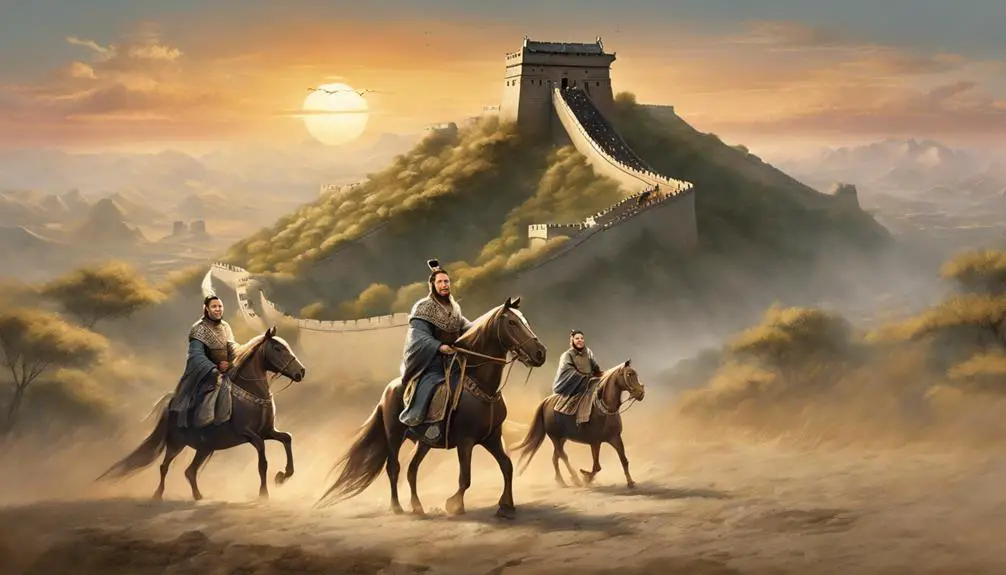
Turning our focus to China, often depicted as 'the Kings from the East' in biblical prophecy, it's crucial to understand the historical and scriptural nuances behind this designation. This title isn't just a geographical marker but carries deep historical and cultural significance that's intertwined with China's ancient past and its perception in biblical times.
The Great Wall, a symbol of China's strength and isolation, plays a pivotal role in understanding the country's biblical depiction. It's not merely a physical barrier but a representation of China's ability to protect its culture and people from external influences. This isolation could have contributed to the mystique and reverence with which the 'Kings from the East' were viewed, emphasizing their perceived power and majesty in biblical texts.
Furthermore, the Silk Road's impact on ancient trade and cultural exchange can't be understated. It served as a conduit for China's interaction with the West, facilitating not only the exchange of goods but also ideas and religious beliefs. This cross-cultural interaction likely influenced how China was perceived by biblical authors, associating it with wealth, wisdom, and exotic goods, all of which contribute to the portrayal of China as a powerful entity in biblical prophecy.
Analyzing China's depiction as 'the Kings from the East' thus requires an appreciation of its historical and cultural context. The Great Wall's significance and the Silk Road's impact are key to understanding the nuanced portrayal of China in biblical texts, reflecting both its isolation and its connections to the broader ancient world.
Symbolic Representations

China's portrayal in biblical texts often manifests through symbolic representations, linking its historical significance to prophetic imagery. Ancient allegories and cultural metaphors abound, providing a rich tapestry through which to understand the nation's role in scriptural narratives. You're delving into a world where symbols carry weight, and historical contexts give depth to the present understanding.
Here are key points to appreciate the symbolic representations of China in the Bible:
- Dragons and Serpents: Often, dragons in biblical prophecy are interpreted as symbols of powerful empires. China, historically known as the land of dragons, fits into this allegory, signifying its potent influence and strength.
- The Kings from the East: This term could symbolically refer to nations east of Israel, with China being a prime candidate due to its geographical position and historical significance.
- Rivers and Waters: Symbolizing life and movement, rivers in prophecies can also denote the flow of ideologies and cultural influences. China's great rivers, like the Yangtze and Yellow River, could metaphorically represent its civilizational force spreading outwards.
- Walls and Fortresses: The Great Wall of China might be seen as a symbol of protection and isolation, reflecting on themes of security and separation prevalent in biblical prophecies.
- Gold and Riches: References to wealth in the scriptures could be allegorical to nations like China, historically rich and a source of luxury goods, symbolizing material wealth and spiritual poverty.
Understanding these allegories and metaphors enriches the analysis, providing a nuanced view of China's depiction in biblical literature, devoid of modern implications of prophecy, focusing purely on historical and symbolic interpretations.
Modern Implications of Prophecy

While the symbolic representations of China in biblical texts offer a fascinating historical insight, it's crucial to consider how these interpretations hold implications for contemporary discussions of prophecy. The exploration of these ancient scripts, when juxtaposed with present-day geopolitics, reveals a layer of prophetic accuracy that cannot be dismissed lightly. You're now navigating a terrain where history and modernity converge, revealing potential global consequences that merit careful consideration.
Aspect |
Implication |
|---|---|
Prophetic Accuracy |
Validates the relevance of ancient texts |
Global Consequences |
Highlights potential geopolitical shifts |
Interpretative Challenges |
Calls for nuanced understanding |
Contemporary Relevance |
Connects past prophecies with current events |
The table above emphasizes pivotal points that bridge ancient prophecies with today's geopolitical landscape. The prophetic accuracy of these texts, when they seemingly align with current events involving China and Russia, adds a layer of complexity to our understanding of global dynamics. This is not about claiming a direct, unerring prediction of modern events, but rather recognizing patterns that resonate with the symbolic representations found within biblical narratives.
These discussions extend beyond mere academic interest, touching on the very real implications these interpretations might have on international relations and global stability. As you delve deeper into this subject, it's essential to approach it with both a critical eye and an appreciation for the historical and cultural contexts that shape these prophecies. The modern implications of these ancient texts remind us of the interconnectedness of our world, where history, prophecy, and current events are inextricably linked, challenging us to consider the broader implications of our interpretations.
Controversies and Debates
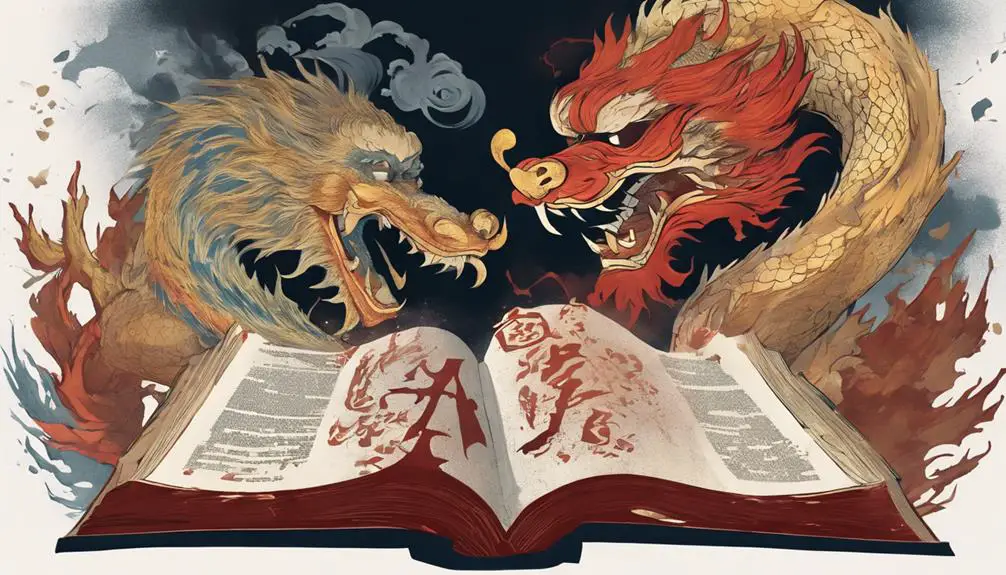
Diving into the controversies and debates surrounding the interpretation of China and Russia in biblical texts, it's clear that scholars and theologians are far from reaching a consensus. At the heart of these debates are several key issues:
- Translation challenges: Ancient texts are notoriously difficult to translate. Every word choice can significantly alter the perceived meaning, especially when dealing with languages that have evolved or disappeared. The Bible, translated over centuries into countless languages, is subject to these challenges. Scholars argue over the correct interpretation of terms that could refer to regions now known as China and Russia.
- Cultural biases: It's undeniable that cultural biases influence interpretation. Historically, Western interpreters have approached the Bible through their own cultural lens, potentially skewing the representation of Eastern entities like China and Russia.
- Historical context: Understanding the historical context of biblical times is crucial. Debates often arise over whether references to nations or peoples can be directly linked to modern states or if they symbolically represent broader concepts.
- Prophetic interpretations: Prophecies are particularly contentious. Some view them as predictions of specific events involving nations like China and Russia, while others see these interpretations as stretches, influenced more by current geopolitical climates than by the texts themselves.
- Scholarly disagreements: Even among scholars, there's no consensus. Some argue for a literal interpretation that includes modern nations, while others advocate for a more symbolic or allegorical approach.
These controversies highlight the complexity of interpreting ancient texts in a modern context. They underscore the need for careful, nuanced analysis free from oversimplification and bias.
Frequently Asked Questions
How Have Various Religious Communities and Denominations Differently Interpreted the Presence (Or Absence) of China and Russia in Biblical Texts?
You're diving into how religious communities and denominations have uniquely interpreted texts, focusing on symbolic interpretations and historical context. They often read between the lines, seeing countries not explicitly mentioned as symbols for broader themes or future events. These interpretations vary widely, reflecting each group's doctrines and historical perspectives.
It's a blend of analyzing ancient texts through modern lenses and seeking relevance in today's geopolitical landscape, all while navigating the complexities of faith and interpretation.
What Are the Ethical Implications of Attributing Modern Geopolitical Events to Ancient Biblical Prophecies Concerning Nations Like China and Russia?
When you attribute modern geopolitical events to ancient biblical prophecies, you're treading on thin ice regarding historical accuracy and cultural sensitivity.
It's essential to analyze these interpretations within a historical and contextual framework, understanding that such connections might oversimplify complex international relations.
This practice can also lead to ethical dilemmas, as it may influence perceptions and actions towards nations based on potentially flawed or biased interpretations of religious texts.
How Do Non-Abrahamic Religions View the Notion of China and Russia Being Mentioned or Alluded to in the Bible?
Diving into the heart of the matter, you'll find that non-Abrahamic religions may not hold the Bible's narratives in the same light, especially regarding mentions of nations like China and Russia.
Their cultural perceptions and interpretive methodologies differ, focusing more on their own historical and spiritual texts. They analyze these claims through a lens shaped by their unique traditions and beliefs, often viewing them as outside their spiritual realm and historical context.
In What Ways Have Popular Culture and Media Influenced the Perception of China and Russia's Roles in Biblical Prophecy?
In popular culture and media, you've seen how stereotypes and sensationalism shape perceptions, especially regarding prophecy. This influence extends to how you view nations in historical and prophetic contexts.
Media stereotypes often paint these countries in broad, simplistic terms, affecting your understanding. Similarly, prophecy sensationalism in films, books, and articles can skew your views, emphasizing dramatic interpretations over nuanced, historical analysis. This shapes how you perceive any nation's role in prophecy.
Are There Any Significant Archaeological Discoveries That Challenge or Support the Interpretations of China and Russia's Presence in Biblical Texts?
Imagine you're digging through history's layers, uncovering truths and myths alike. When examining archaeological findings, you won't find concrete evidence linking specific countries to biblical narratives directly. Instead, through textual analysis, you'll notice historical inaccuracies that challenge traditional interpretations.
Scholars rely on historical context and linguistic studies rather than physical artifacts to understand these ancient texts. So, no, there aren't significant discoveries that definitively support or challenge the presence of modern nations in biblical scripture.
Conclusion
In conclusion, while historical and symbolic interpretations suggest Russia and China's roles in biblical prophecy, it's pivotal to question: how do these ancient texts mirror today's global dynamics?
The controversies and debates surrounding their mention only underscore the complexities of applying age-old prophecies to modern geopolitics. Ultimately, deciphering these scriptures requires a nuanced understanding of both past contexts and current events, urging us to consider the implications of prophecy in our contemporary world.


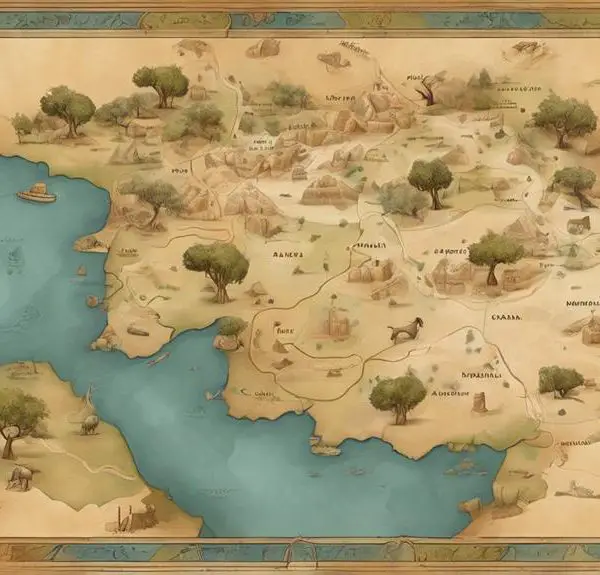
Sign up